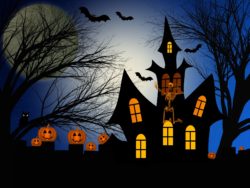Originally published 10-26-2017
Happy Halloween! Here are some of the stories behind the words of Halloween!
Trick or Treating
The practice of trick or treating began with the Celtic tradition of celebrating the end of the year by dressing up as evil spirits. The Celts believed that, as we moved from one year to the next, the dead and the living would overlap, and demons would roam the earth again. So dressing up as demons was a defense mechanism. If you encountered a real demon roaming the Earth, they would think you were one of them.
The Catholic Church turned the demon dress-up party into “All Hallows Eve,” “All Soul’s Day,” and “All Saints Day” and had people dress up as saints, angels, and even demons.
But trick or treating did not migrate along with Europeans to the United States. It didn’t re-emerge until the 1920s and 1930s. Then, it paused for a bit during World War II because of sugar rations.
The term “trick or treat” dates back to 1927.
The British apparently hate Halloween. In 2006, a survey found that over half of British homeowners turn off their lights and pretend not to be home on Halloween.
Halloween
Halloween also known as Allhalloween, All Hallows’ Eve, or All Saints’ Eve, begins the three-day observance of Allhallowtide, the time in the liturgical year dedicated to remembering the dead.
It is believed that many Halloween traditions originated from ancient Celtic harvest festivals and that such festivals may have had pagan roots. Some believe, however, that Halloween began solely as a Christian holiday, separate from ancient festivals.
In many parts of the world, the Christian religious observances of All Hallows’ Eve, including attending church services and lighting candles on the graves of the dead, remain popular, although elsewhere it is a more commercial and secular celebration. Some Christians historically abstained from meat on All Hallows’ Eve, a tradition reflected in the eating of certain vegetarian foods on this day, including apples and potato pancakes.
Jack-O-Lantern
The original jack-o’-lanterns were carved from turnips, potatoes or beets.
People have been making jack-o’-lanterns at Halloween for centuries. The practice originated from an Irish myth about a man nicknamed “Stingy Jack.” According to the story, Stingy Jack invited the Devil to have a drink with him. True to his name, Stingy Jack didn’t want to pay for his drink, so he convinced the Devil to turn himself into a coin that Jack could use to buy their drinks. Once the Devil did so, Jack decided to keep the money and put it into his pocket next to a silver cross, which prevented the Devil from changing back into his original form. Jack eventually freed the Devil, under the condition that he would not bother Jack for one year and that, should Jack die, he would not claim his soul. The next year, Jack again tricked the Devil into climbing into a tree to pick a piece of fruit. While he was up in the tree, Jack carved a sign of the cross into the tree’s bark so that the Devil could not come down until the Devil promised Jack not to bother him for ten more years.
Soon after, Jack died. As the legend goes, God would not allow such an unsavory figure into heaven. The Devil, upset by the trick Jack had played on him and keeping his word not to claim his soul, would not allow Jack into hell. He sent Jack off into the dark night with only a burning coal to light his way. Jack put the coal into a carved-out turnip and has been roaming the Earth with ever since. The Irish began to refer to this ghostly figure as “Jack of the Lantern,” and then, simply “Jack O’Lantern.”
In Ireland and Scotland, people began to make their own versions of Jack’s lanterns by carving scary faces into turnips or potatoes and placing them into windows or near doors to frighten away Stingy Jack and other wandering evil spirits. In England, large beets are used. Immigrants from these countries brought the jack o’lantern tradition with them when they came to the United States. They soon found that pumpkins, a fruit native to America, make perfect jack-o’-lanterns.
Witch
Goblin
From the early 14th century, “a devil, incubus, fairy”; from Old French gobelin.
https://blog.oxforddictionaries.com



Leave a Reply